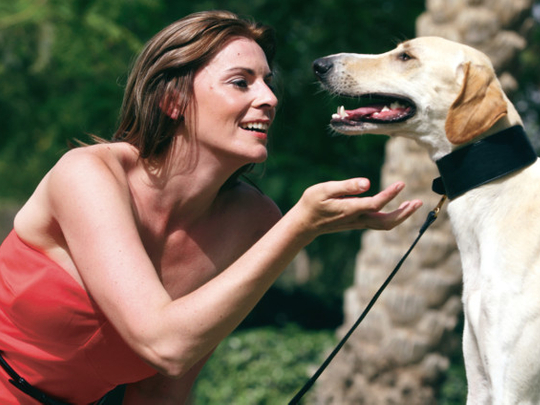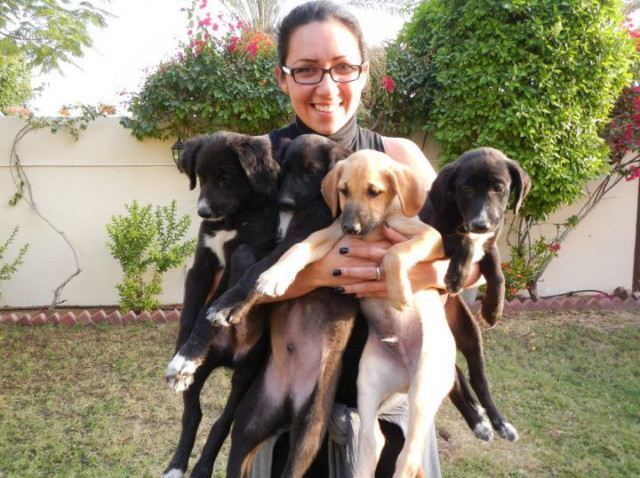
Abu Dhabi: Salukis dumped in the UAE are finding their way into plush homes in the West as animal lovers and volunteers rescue them and get them adopted.
Nin Salres, a volunteer in Belgium, said she has rehomed around 50 Salukis from the region, half of them from the UAE, in European homes alone in the last two years. Many more make their way to the US.
“It gives me great joy to see these abandoned animals running on the beach or on the lawns with their new owners here,” the 58-year-old dog lover told XPRESS from her home in Ekaran of north Belgium.
Malanie Stones of Animal Action Abu Dhabi, which has rescued over 300 Salukis and Saluki-crosses in the last two-and-a half years, said the pure breeds are popular in the West because there is a lot of greenery which is well-suited to keep the athletic animals as pets.
The demand for Salukis also revolves round their mystic appeal. Known as the Persian Greyhound or Royal Dog of Egypt, they are one of the oldest breeds of domesticated dogs with archeaological images dating back to 10,000 BC. The Salukis are sighthounds which have historically traveled with caravans and nomadic tribes through the Middle East and Silk Route and have traditionally been bred by Arabs for hunting and racing.
Far Cry
The Salukis found abandoned, however, are far removed from their original beauty. Stones said: “Some of them carry raw wounds, have their ears cut off, are extremely emaciated and stay on a drip with a vet for several days. They also have behaviourial issues and tend to be frightened.”
Animal lovers either find them on their own or they are referred to them by others. They are usually discoverd along the highways, or come from farms and shelters.
But why are so many Salukis abandoned?
Catherine Gomis, an Australian dog lover in Dubai who has rescued six Salukis since November last year, said: “Saluki racing and beauty contests are big in the UAE. But a saluki that is not successful is of little use.”
Stones said many Saluki owners don’t take their pets with them when they leave the country. “It is expensive to fly them. They are also used for breeding and are given away after a litter. And of course, there are people who get rid of Salukis when they no longer run fast or hunt well.”
Rehoming Challenge
The challenge before animal rescue groups is to restore them to good health before fostering and rehoming them.
Gomis said they must be fully vaccinated, dewormed, microchipped and spayed/neutered before going to the next step. “In some cases, they may need prolonged medical treatment.”
They are then put up for fostering or adoption through word of mouth or on social media websites.
Stones said some dogs could wait for up to six months to find a suitable home. “Bunny and Clyde for instance have been with us for six months, They are due to fly to Amsterdam on May 3. I will be driving them down to England and fostering them for a while before I can find permanent homes for them,” said Stones who will be in England then.
Said said suitable homes are found after doing a thorough home-check. “We are always looking for volunteers to foster the dogs for a while, till a home or flight is found. For flights too, we look for volunteer flight buddies who are willing to take our dogs as extra baggage,” she said.
Cost Factor
All of this comes at a cost. The adoption fee is 400 Euros but this does not cover the rescue expenses.
Gomis said, “Shelter dogs can cost us Dh420-500 to be neutered/spayed, vaccinated and microchiped. Rescued dogs or strays can cost more depending on how much medical care they need.”
George, a dog that is waiting for adoption with her, ran up a vet bill of Dh998, she said.
The export of the dogs involves additional expenses: a vet health certificate for Dh300, an export health certificate for Dh312, a dog crate for aircraft transport for Dh450 and so on. The cost for dogs to travel as excess luggage varies with airlines and destinations.
So volunteers depend on money raised through garage sales, auctions and flea markets to pay for their expenses. .













